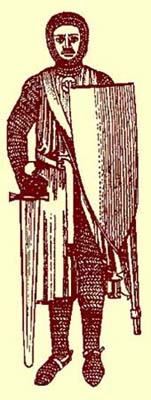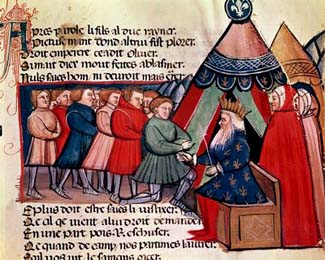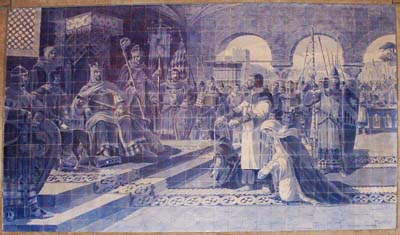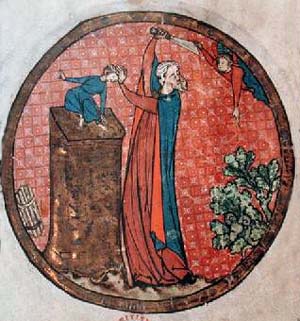 |
Formation of Children
The Role of Loyalty in Life
Marian T. Horvat, Ph.D.
The Small Manual of Civility reminds us of the importance of the spoken word, of fidelity to a higher cause, of the chivalric ideal of loyalty. It invites us to put aside the theatrical and sentimental notions of the synthetic brand of loyalty that often comes from Hollywood, and adopt the true loyalty of the honorable man of Christendom. That is, to be a man whose word has meaning because he is a man willing to give his very life for the cause of God and fatherland.
Let fathers reflect well on the virtue of loyalty, and give worthy examples to their sons in both the small as well as great things of life.
Honor and loyalty are almost synonymous terms that awaken visions of heroism and nobility, above all in youth.

William Marshal, the chivalrous knight, loyal throughout his life |
The most perfect code of all the virtues is without doubt the Gospel. However, alongside it, institutions have been formed that present its principles, virtues and magnanimity. Among such institutions the orders of Chivalry stand out in an eminent way. For centuries they have provided examples of rare and heroic virtues. Today there are still some remnants of these celebrated orders in the Orders of Malta, Calatrava and Alcântara, and the Order of Christ.
The fundamental precepts for the Military Orders included honor, loyalty, fidelity to one’s word, sincerity of heart, and death before ignominy. Unfortunately, however, almost everywhere the Chivalry inspired by Christendom for the protection of the weak and the oppressed, for combating the barbarian, egoism and the lie, has been extinguished.
Modern day generations are ignorant of the magnificent facts of past centuries. Therefore, they look disdainfully at these institutions that have fallen into decay in our times under the influences of pride and sensuality - the direct fruits of Protestantism.
Today, loyal men of proven integrity are increasingly hard to find. With the increasing drift to paganism in the social institutions, the characters of men have lost their old temper, made of unbreakable honor. Hypocrisy, fraud and the lie seem to have acquired citizenship in social institutions.
Movies constitute the modern school of the art of pretense; they are damaging the characters of many men and women, both old and young.
What is loyalty?
To be loyal is to be true to oneself and to one’s neighbor. To be true to oneself, one should align his actions and words with his sentiments, and his sentiments with the laws of Morals and the common good. One is true to one’s neighbor when he opportunely expresses what he feels, what he knows, and such as he knows it.
Loyal persons, enemies of dissimulation, disguise, and pretense, are most rare. Loyalty is not only demanded in important and elevated matters. It is the condition for and the soul of relations between men, as much for one who governs as one who teaches, for both the buyer and the seller, the one who commands and the one who obeys. To be loyal is to respect one’s given word, not to conceal a second intention, not to sacrifice the higher cause for the secondary. An honorable man has only one word, be it explicitly stated or manifested in another way.

Knights pledging their allegiance to Charlemagne,
from a Venetian codex |
Lies, disloyalty and fraud create distrust and suspicion in our relations with others. In times past when good faith reigned among Catholic peoples, a hand shake sufficed to seal a contract. A piece of hair was sufficient surety of the inviolable promise.
The child is accustomed to say yes and no, in accordance with what he knows and thinks. But the current language is laden with dubious expressions, paraphrases, hidden meanings, reservations, and ambiguous terms. For the loyal man, his word is the mirror of his heart, the enemy of dubiety, contradiction and disguise. He speaks clearly, and says what he means.
A man without loyalty insinuates himself into the business of others, using his means or position to double-cross benevolent or weak friends. He freely promises without the intention to fulfill his word. He praises with his lips and reproves with the heart; he is red today and yellow tomorrow; today the rat, tomorrow the bat. The loyal man does not assume two different attitudes: to be at the same time cobra and lizard, Pharisee and Publican, lamb and wolf, Catholic and free thinker.
Fortunate, indeed, is the man who could have this epitaph carved on his tombstone: “He was always loyal.” It is, in effect, the synthesis of all the virtues and constitutes a grand eulogy. It announces the man who was upright, honorable, and faithful, a man with integrity of character.
Historic cases of loyalty
King Alphonse VII ordered his Castilian army to surround the city of Guimarães until King Afonso Henriques of Portugal would pay homage to him. However, Egaz Moniz de Aragao, preceptor of the young Afonso Henriques, left the city with his family and offered their liberty and lives in exchange for lifting the siege. Touched by the loyalty of Moniz to his homeland, his captors spared his life and granted the request. King Afonso Henriques, the first King of Portugal, was thus saved from vassalage by the loyalty of Moniz.

Egaz Moniz offering himself and his family as slaves to the King of
Castile in order to save his lord Dom Afonso Henriques |
William Marshal served King Richard faithfully as knight, vassal, ambassador, itinerant justice, counselor and friend. On the King’s untimely death in 1199, Marshall supported John as heir to the throne. Later, John falsely accused Marshall of being a traitor, confiscated his English and Welsh castles, and took his two older sons as hostages.
Despite this, William Marshal remained loyal to his feudal lord. He considered that breaking his feudal bond and oath would be treason and dishonor. On the death of John in 1216, William Marshal was chosen by his peers in England as regent for the 9-year-old Henry II and is ever known in England as the model knight.
When the King of France, John II (1319-1364), learned that one of his sons, held prisoner in London as surety, had fled the prison, the old King left his court and offered himself as prisoner in the place of his fugitive son. He spoke these noble words:
“If loyalty and good faith were by chance banished from the rest of the earth, they would still be found in the heart of the King.”
Biblical examples of loyalty

An Angel comes to stay the hand of Abraham sacrificing Isaac |
The classical model of loyalty in the Old Testament is the case of the sacrifice of Isaac by Abraham (Gen. 22). God tested Abraham’s loyalty by asking him to take his only son to Mount Moriah and offer him as a sacrifice. Because of Abraham’s willingness to offer even the life of his beloved son to demonstrate his trust and loyalty, God spared Isaac and blessed Abraham and his family.
The Second Book of Maccabees offers another example of loyalty. Oppressed by pagan conquerors, the Jews were summoned to deny the truth of their religion by violating holy laws. One old man named Eleazar, although threatened with torture and death, refused to eat the pork that was forbidden by Jewish law. Some of the pagans, moved by pity, offered to him to bring a different, acceptable meat so that he give the impression that he was carrying out the King’s orders.
He refused to do this and in a noble manner, worthy of his years, remained loyal to the holy laws given by God, saying, ‘I will leave to the young a noble example of how to die willingly and generously for the revered and holy laws’ (2 Maccabees 6: 28). After saying these words, he was dragged away to suffer torture and death.
These examples from Scriptures, like the lives of the martyrs, teach us the importance of being loyal first to the laws of God, even above the laws of country or family sentiments.

Posted May 31, 2007

Related Topics of Interest
 Good and Bad Curiosity Good and Bad Curiosity
 Discretion in Words and Actions Discretion in Words and Actions
 Is Being Frank Always Advisable? Is Being Frank Always Advisable?
 The Importance of the Greeting The Importance of the Greeting
 Order in the Professional Life Order in the Professional Life
 Order and the Spirit of Order Order and the Spirit of Order
 Four Ways to Discern a Man's Soul by His Appearance Four Ways to Discern a Man's Soul by His Appearance
 Dressing Well - Vanity or Virtue? Dressing Well - Vanity or Virtue?
 St. Isidore of Seville and the Dignified in Manner St. Isidore of Seville and the Dignified in Manner
 R-CR in the Tendencies, Ideas and Facts R-CR in the Tendencies, Ideas and Facts

Related Works of Interest
|
|
Formation | Cultural |
Home | Books | CDs
| Search | Contact Us
| Donate

© 2002- Tradition in Action, Inc. All Rights Reserved
|
 |
|